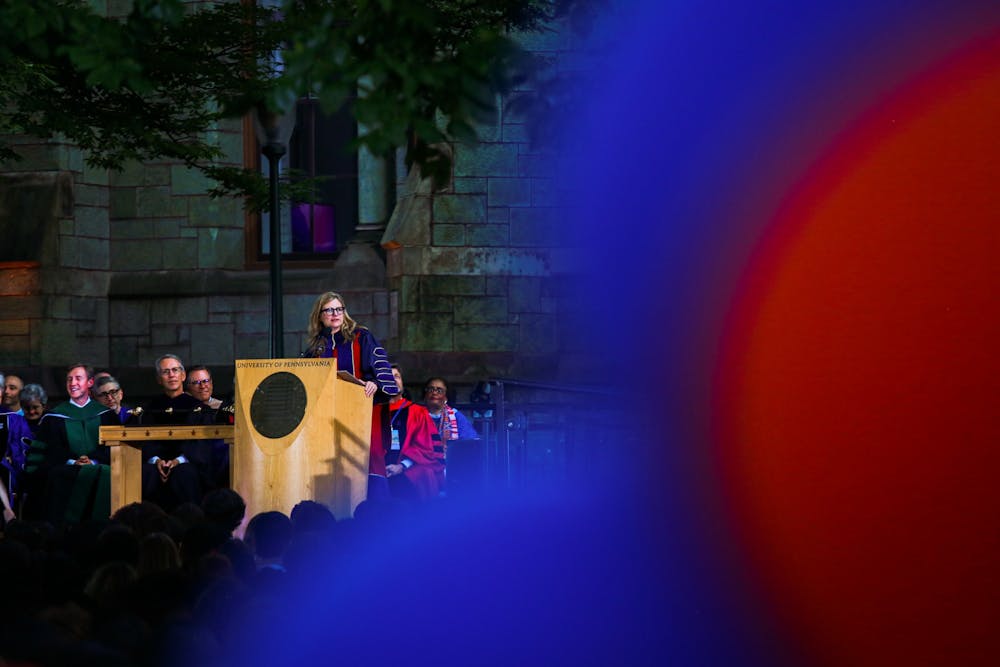
Read the full interview here.
Liz Magill was nominated as Penn's ninth president on Jan. 13. One year later, The Daily Pennsylvanian sat down with Magill on Jan. 9 to discuss her presidency so far, including getting to know Penn and Philadelphia, her aspirations for the future, and ongoing initiatives that she hopes to highlight as she enters the second semester of her tenure.
Magill talked about both personal and professional memories from the past year as well as issues such as climate change, Penn's relationship with the West Philadelphia community, and the search for new administrators. Magill also discussed her challenges and goals as president and for the Penn community as the University's first new leader in 18 years.
"From afar and thinking about this job and having an opportunity to have this job, I kind of had this hypothesis that this was the most exciting presidency in the United States, at a higher education institution. I would say that that hypothesis has been really valuable," Magill said.
Below are five main takeaways from Magill's 25-minute interview with the DP:
1. Working towards a set of University priorities
While her time as president began in July, Magill was formally inaugurated in October. In the week before her inauguration, Magill announced The Red and Blue Advisory Committee as an effort to determine the University's priorities for the next century.
Magill told the DP The Red and Blue Advisory Committee is still in engagement stages and will hold forums in the next few weeks. She added that she regularly meets with the chair of the committee, Annenberg School of Communication Dean John L. Jackson. The committee – which consists of 15 members including professors, administrators, and students – is dedicated to enhancing the institution and its participation in the community around it.
2. Continuing efforts to become a carbon-zero University
In response to a question about her focus on climate in her inauguration speech, Magill said she is also committed to continuing Penn's efforts to become a carbon-zero institution. As part of this, she said Penn will soon publish its update to the Climate and Sustainability Action Plan 3.0, for which the University has hired a group of chemists and engineers in an effort to find a carbon-neutral future.
Additionally, Magill added that when the Power Purchase Agreement – an operational change in progress – is in effect, more than 70% of Penn’s energy will be produced from carbon-free sources. Magill said she believes that the most important effort the University is taking is its net zero investment commitment because it allows the reinvestment of funds in companies that care about the future.
The commitment to net-zero investment was highlighted in a November statement from Magill and Board of Trustees Chair Scott Bok, where they announced that Penn no longer holds direct investments in fossil fuels. The announcement followed a renewed campaign by Fossil Free Penn this semester that Penn divest from fossil fuels. Most recently, FFP stormed Penn’s Homecoming football field on Oct. 22 during the game’s halftime, leading to 19 arrests.
"The students' views always play a role in what we're doing," Magill said when asked whether student activism played a role in the November announcement. "You're some of the most talented people in the country, and you're here, and you have perspective on what we're doing, [and] what we could do better. So I don't know if I'd say anything more than that. I'm always listening."
3. Expanding Penn's relationship with the West Philadelphia community
Magill said that she had observed "a lot of sentiment" that Penn should continue to "double down" on complex societal issues, including climate change, sustainability, and Penn's relationship with the West Philadelphia community. In response to a question about a recent student government survey where students listed relations with the West Philadelphia community as top priority, Magill noted that she had heard also concerns surrounding affordable housing.
"[T]his fall, we asked a group of faculty to engage and think about what we can do in affordable housing in Philly in the coming years," Magill said. "So that's not an entirely new issue for us, but it's newly significant. I think we should be doing more."
4. Searching for successors to departing administrators
Penn is also searching for successors to the deans of the Graduate School of Education and Penn Carey Law School, who will be leaving at the ends of their terms in June, as well as the provost position, which is currently occupied by Beth Winkelstein in an interim capacity. Magill said the search was not about the schools' already strong rankings, but rather people who can maximize the potential of the job.
5. Reflecting on her first year and the upcoming semester
As Magill herself continues to transition into her new job, she described her experience moving into and exploring Philadelphia as “incredibly energizing.” Magill said she has gotten to know the Penn and Philadelphia community and has become more knowledgeable in her first few months. Over the summer, Magill got to know civic and community in West Philly and also explored history, art, culture, and food.
Her favorite moments so far have been getting to meet the Class of 2026 in the Philadelphia Museum of Art, throwing the Phillies' first pitch "and not embarrassing myself," and visiting the new Barnes Museum.
She praised her team for allowing a smooth transition between presidencies.
Magill concluded the interview by saying “I have the best job in the world."
The Daily Pennsylvanian is an independent, student-run newspaper. Please consider making a donation to support the coverage that shapes the University. Your generosity ensures a future of strong journalism at Penn.
Donate







